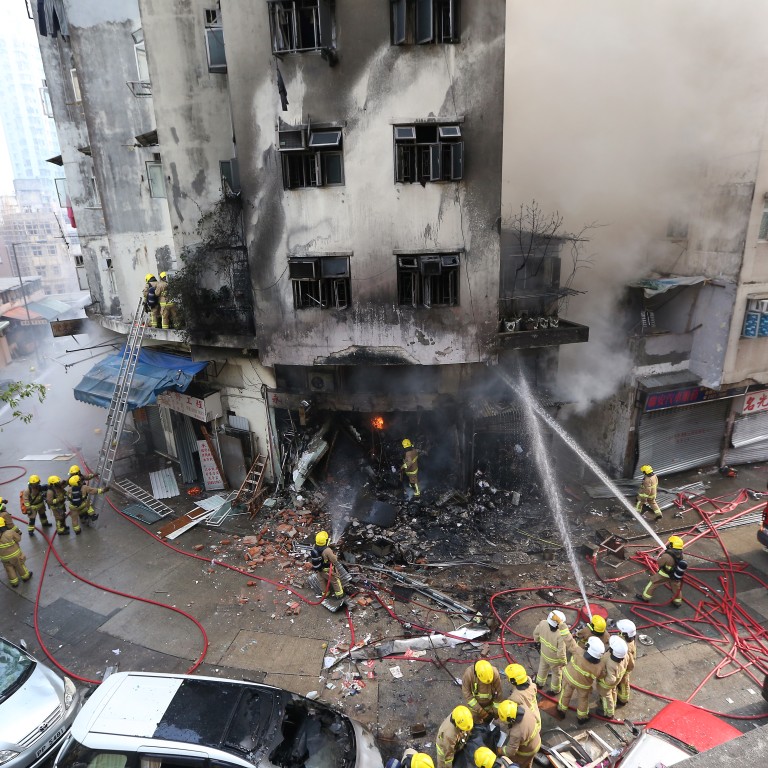
Hong Kong's LPG taxis and minibuses need tighter safety controls
Albert Cheng says banning LPG vehicles from using non-approved garages for repairs will allow fearful residents to sleep at night
They are ubiquitous on the streets of Hong Kong. Yet, few people saw LPG taxis as ticking time bombs until a deadly explosion at a garage in Wong Tai Sin last Sunday.
A cab driver, the garage owner and the owner of a shop next door were killed in the blast on Wan Fung Street. The garage is on the ground floor of a residential building which houses 22 families. A nearby home for the elderly had to be evacuated. Windows were shattered, buildings shaken and vehicles badly damaged.
The driver had just taken in his car for minor repairs. An initial investigation by the Electrical and Mechanical Services Department indicated that the vehicle's LPG tank remained intact. But authorities have not ruled out the possibility of an LPG leak from either the tank or a connecting tube.
A police source suggested that a passer-by who lit a cigarette outside the workshop might have triggered the series of explosions. The smoker was among the nine injured.
Taxis in Hong Kong run on LPG. A pilot scheme was introduced in 1996 to see whether LPG could replace the less environmentally friendly diesel and petroleum. It proved successful and, since 1999, all new taxis are required to have factory-built LPG tanks. The government offered a cash grant to each taxi owner who purchased a new LPG taxi to accelerate the change.
I had grave reservations about the switch at the time, on practical grounds. There were, and still are, inadequate services for the fleets of LPG-powered vehicles. There are only 67 LPG filling stations throughout the territory. Of them, just 12 are dedicated sites. That explains why there are often long queues at some more conveniently located LPG stations.
As exposed by this tragedy, another problem is the lack of qualified mechanics and facilities to service the taxis. The Transport Department has capped the number of taxi licences at 18,138 - 15,250 for the urban areas, 2,838 for the New Territories and 50 for Lantau Island. They carry some one million passengers daily.
There are also more than 3,100 public light buses in Hong Kong, about two-thirds of which run on LPG. That means over 20,000 such public transport vehicles require regular servicing.
Under the Gas Safety Ordinance, only mechanics approved by the Electrical and Mechanical Services Department are eligible to conduct maintenance on LPG fuel systems at designated garages. Only 29 of the 2,700 garages in the city are permitted to handle LPG-related work.
Each has to look after the LPG systems of an average of 700 heavily used taxis and minibuses. They are located in more remote sites as part of the licensing conditions.
Time is money and it's only natural that some taxi drivers will use non-approved garages. It is hard for regulators to know whether a non-approved garage is working on the gas tank or not.
Apart from the general fire and building safety provisions, there is no specific regulation to govern day-to-day repair works in non-LPG garages. The garage in question was not on the approved list.
In 2000, an official working committee was established to see how the trade should be regulated to ensure public safety. Five years later, officials told the Legislative Council that its target was to make it mandatory for all garages to be registered from 2008. The plan has flopped.
Instead, the authorities came up with a voluntary charter for garage owners to initiate such measures as no-smoking zones and ensuring mechanics handle gases with care. Only 15 per cent of the garages signed.
There is a similar voluntary registration scheme for the 9,000 mechanics. About seven in 10 have signed up. They are supposed to follow the safety working guides prescribed by the Electrical and Mechanical Services Department.
There is no evidence so far that the Wong Tai Sin garage actually worked on the taxi's LPG system. This has led to an even more urgent problem: the mere presence of a taxi in a non-LPG-approved garage might constitute a potential threat to the neighbourhood, given that a mechanic might be working on other parts of a taxi or mini-bus and have no idea that gas was leaking from the tank. Any spark could set off an explosion.
After the incident, officials said they would revisit the need for a registration system for garages. Yet, if the garages are allowed to continue to operate in densely populated areas, the threat to the public remains real.
The only way to set residents' minds at ease is to ban all LPG vehicles from using non-approved garages. That should be easy to execute. Of course, it will create a big demand for approved garages and a transition period will be needed.
Officials have been bogged down by pragmatic considerations for more than a decade. Now blood has been spilled, public safety should no longer be overridden by possible resistance from the trade.

